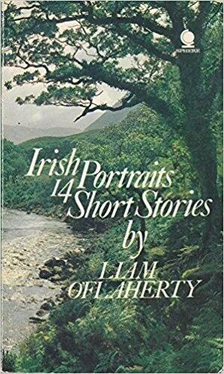For three months he went around Dublin drinking the money they had given him and swearing to his boon companions that they would not get rid of him as easily as they thought. He knew too much about some of them. He wasn’t going to keep his mouth shut very long unless they came across with the money. They had ruined his life, but now he was up for auction and the highest bidder could have him. As there were many more like him going about the public-houses with the same story, nobody took any notice of his talk. But Brunton had become desperate and there was one politician who was really in his power. He was now waiting for that man. He had sent a message into his office that morning.
At twenty minutes past three, Mr. Matthew Kenneally, the politician for whom Brunton was waiting, walked into the select bar. He hardly made any noise entering, pushing the swing door inwards gently, and then pausing, with his gloved hand on the door and half his figure within it. He looked around the room casually and saw Brunton, When he saw Brunton, he raised his eyelids and creased his forehead but showed no emotion, either of surprise or of fear, in his face. Then he nodded slightly, and entering fully, closed the door behind him.
Brunton coughed and shuffled his body on his chair but did not speak. Mr. Kenneally advanced up the room slowly without speaking.
Mr. Kenneally was a tall, slim man with a very long, sallow face and a narrow skull that tapered at the rear to a point. There was nothing extraordinary or remarkable about his face, except the fact that it aroused no interest whatsoever when one looked at it. It was impossible to fix on any one feature, because all the features struck one at the same time, and the only impression that one received was an impression of sallowness and length. The face was more grey than sallow because the grey eyes diffused their own limpid light over all the features. His figure, however, and his clothes made a very acute impression, but an unpleasant one. His figure was so long and slim that he looked like an eel, but not like an eel after all, because an eel moves rapidly, whereas Mr. Kenneally was never in a hurry and all his movements were slow and measured, noiseless, as if his joints were greased. His hands were remarkably long and he was always biting his finger-nails, as if to draw attention to the length of his fingers, or perhaps because he was ashamed of their length and couldn’t help playing with them. His clothes, too, were always in tone with the colour of his face. Not grey, as one might expect, but a shade of brown, with greyish spots in it. And lastly, he had no shoulders to speak of, so that he always had his hands in his pockets in order to support their length, and he twisted himself along in a curious way, without any apparent assistance from his hands or shoulders, but simply propelling himself by a twisting movement of the hips.
Mr. Kenneally was now forty-five years of age. Recently he had become a “made man”; but everybody still remembers the time when he was “a Sunday man,” a curious type of person that is unknown outside Dublin, a man who never pays his debts and goes abroad only on Sundays, when writs cannot be served. In those days he had an office on the quays, a lawyer’s office, with a name written on a nameplate in a dark hallway and a small room up three flights of stairs, where there was only a roll-top desk and a chair and where no business was done, as far as anybody could see. How he had wriggled himself into respectability and affluence nobody knows, but in times of social upheaval these characters seem to be best fitted by nature to come to the surface and lead better types. They blossom forth for a time and then wither away, leaving no trace whatever. They are neither representative of their race nor of their time; but rather an indication of the obscene instruments which humanity uses now and again to propel itself forward.
Mr. Kenneally advanced along the room to the little square hole in the wall, through which the attendant served drinks. As he advanced he kept his eyes on Brunton’s face and Brunton returned the look. The two of them looked casually at one another, both hiding their thoughts, making their faces masks, lest either might give an advantage to the other for the coming struggle, by the slightest indication of emotion. Mr. Kenneally rung the bell, still looking at Brunton. Presently the wooden slide went up, somebody put his hand on the sill and Mr. Kenneally said: “Scotch.” And the attendant said: “Scotch, Mr. Kenneally.” Then there was a pause until the attendant returned with the drink. And during this time the two men still stared at one another. Then Mr. Kenneally took his drink, paid for it, the slide slipped down and Mr. Kenneally slipped along the floor to the table where Brunton was sitting. He still stared, coldly, with lowered eyelids.
“Ye needn’t keep yer eye on me, Matt,” said Brunton suddenly. “I ain’t goin’ to shoot ye. It’s not my game an’ I sold me gun. If I wanted to plug ye it’s not here I’d do it. Ye needn’t bother lookin’ at me.”
Brunton’s voice was soft and thick. The words just rolled out from his lips without any effort and almost without any movement of the mouth. He seemed to have no interest in what he was saying, so that one expected him to stop speaking at any moment, after the second word or in the middle of a sentence. There was absolutely no emotion in his voice, just like the voice of a man whose job it is to deliver verbal messages, in which he has no interest whatever.
Mr. Kenneally sat down, and then, drawing his mouth together, he rubbed the two forefingers of his right hand along his face, from the temple to the jaw, still looking at Brunton, dispassionately. When he finished rubbing his face, he sniffed three times and then shrugged himself. Then he uttered a little dry laugh and put his whiskey to his lips.
“Here’s luck, Mick,” he said very sarcastically.
Brunton watched him drink. He drank very little and rolled it around his palate before swallowing it, sucking his cheeks inwards as he did so. Then he slowly took a cigarette-case from his pocket, extracted a cigarette, lit it and flicked away the match, still looking at Brunton between the eyes. Then he blew out a cloud of cigarette smoke, and leaning his chin on his doubled fists, he twisted around his lips.
“Well,” he said at last. He seemed to talk through his nose, with a sniffing sound. “I got your message. What’s the important business we’re going to discuss?”
“Ye know very well what it is,” Brunton said.
“I’m not God,” said Mr. Kenneally. “How should I know unless I’m told.”
“No, yer not God,” said Brunton with sudden ferocity.
Then he frowned, and seizing his glass of whiskey suddenly, he emptied it. Then he leaned forward, with an expression of fear in his face.
“Yer not God,” he said, “but I think yer the devil.”
“Wish I were,” said Mr. Kenneally, biting his fingernails.
“Well, I’m going to tell ye what I want,” said Brunton. “I want money.”
“Everybody does nowadays,” sighed Mr. Kenneally. “But most people have to work for it.”
“Now none o’ yer coddin’,” said Brunton. “Matt, I want five hundred quid down or I’m goin’ to the Minister for Justice with this.”
He pulled out a large envelope from his breast-pocket, tapped it and then put it back again hurriedly.
“What’s that?” sniffed Mr. Kenneally.
“There’s more than enough in that to get you hung,” said Brunton fiercely. “That’s an account of a job I done for ye.”
“What job is that?” said Mr. Kenneally in a whisper, glancing towards the aperture in the wall as he spoke.
Brunton did not reply for a few moments. They stared at one another. In spite of himself, Mr. Kenneally’s face had become an ashen colour, but his eyes did not shrink from Brunton’s stare.
Читать дальше












